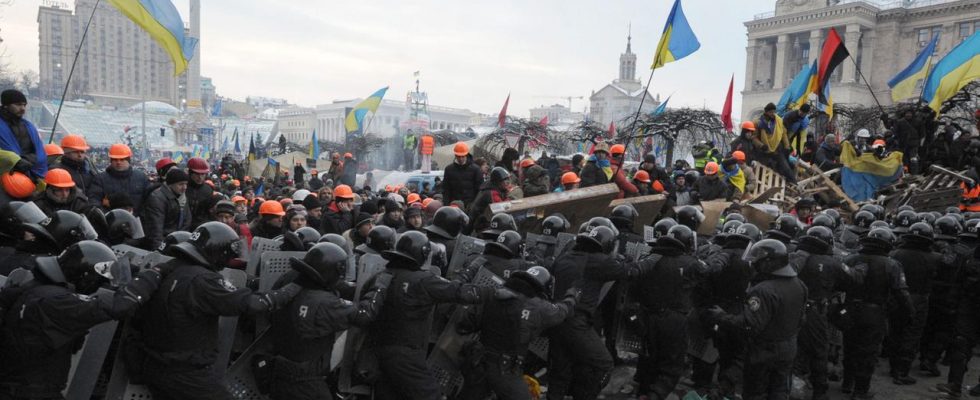Ten years ago, demonstrations for closer ties to the EU began on Kiev’s Maidan. For many Ukrainians, the protest changed the country forever – and not just with regard to Russia.
Oleksandr Kowaljonok lets his gaze wander over Independence Square in Kiev. “This is where the war started for me ten years ago,” says the 31-year-old PR consultant. Since then, nothing in his life has been the same. “The summer of 2013 was the best I had.” Then he grew up, says Kovaljonok.
Kovalyonok was afraid of the security services for the first time on the Maidan. And on the Maidan he saw people for the first time in his life with their hands torn apart by grenades.
Ten years ago, the then 21-year-old was one of the group of students who sparked the revolution. He was angry that then-President Viktor Yanukovych did not want to sign the long-planned association agreement with the European Union.
But he had no idea that the initially peaceful demonstrations would turn into brutal street battles. As a result, Ukraine changed forever.
A “Revolution of Dignity”
New values have been created on Maidan Independence Square, says cultural scientist Natalia Kryvda. It is not without reason that people in Ukraine now call the protests of that time a “revolution of dignity.”
What began as a protest for rapprochement with the EU quickly became a protest for civil rights, democracy and against corruption.
“We began to speak for ourselves as citizens,” recalls Ostap Stasiw. For months, the activist and tens of thousands of people endured bitterly cold temperatures in tents on Independence Square, day and night. They mixed Molotov cocktails, built barricades and a stage for political speeches.
Many dead – and a torn country
As the weeks passed, the brutality of the security forces increased. The protesters tried to protect themselves with signs, sticks and hardhats. Then a few also got firearms. The protests became radicalized.
In the end, security service snipers shot at unarmed people. More than 100 people were killed and the corrupt president fled to Russia in 2014. And Russia, in turn, seized the opportunity and sent special forces to the Crimean peninsula. The war began in eastern Ukraine.
Too radical and too nationalist?
Enrique Menendes observes the events from there. He doesn’t think much of the protesters on the Maidan. Too radical, too nationalistic, he thinks.
For many people in Ukraine today he is a kind of traitor. “I had to flee Donetsk because I was committed to the unity of Ukraine,” he says in a café in Kiev.
Menendes also blames the Ukrainian leadership. He believes that more should have been done to prevent the war. But now only weapons from the West would help. “We have to defend ourselves.”
Demonstrators set up barricades in the central square in Kiev in the winter of 2013. At that time the square was given the unofficial title “Euro-Maidan”.
Nothing is the same anymore
“Before 2014, no one demolished Russian monuments. Kiev was a Russian-speaking city. I spoke Russian myself,” says PR consultant Kovaljonok. “But since 2014 I hate Russia with all my heart.”
He will report to the army in February 2022. He is ready to fight even though he is afraid. More than 20 of his friends have now been killed in the war. Kowaljonok has been collecting donations for the army since the beginning of the Russian war of aggression.
The before and the after
The Maidan protests divide Ukraine’s recent history into a before and an after. A strong civil society has emerged. “We say no when we don’t like something,” says Mustafa Nayem.
He is said to have sparked the protests ten years ago with a post on Facebook. At that time, Nayem was still working as a journalist and later sat in the Ukrainian parliament. Today he is working on rebuilding the country.
The relationship between the state and citizens is different today, says Nayem. Cultural scientist Natalia Kryvda speaks of a cultural change. The Maidan marks the “turn away from the Soviet system and totalitarianism.”
Another land
But the country has not only experienced cultural change in the past decade. Many reforms were initiated. The fight against corruption is particularly important to the population.
In the past, officials could have robbed the state without having to fear consequences. But today journalists and activists regularly publish corruption scandals, which many say is a good sign.
Mustafa Nayem says today that he wanted an even stronger fight against corruption. But despite ongoing major problems, the situation has improved massively in many areas.
The reason for this is also the strong civil society. Many say that Ukrainians never want to lose their maturity again.
Instead, every government must fear pressure from the streets. This is also a legacy of the bloody protests that began in Kiev ten years ago.
Rebecca Barth, ARD Kiev, tagesschau, November 21, 2023 8:50 a.m

